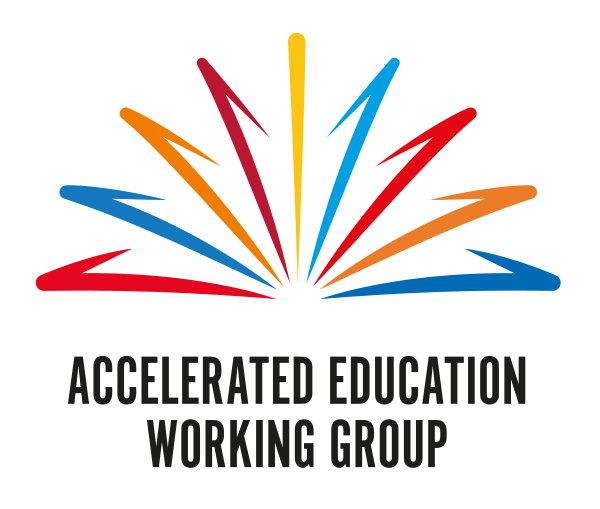AEWG update: Lessons learned from ACCESS
![INEE Logo Vertical English, FullColor [web] INEE logo](https://access-education.auckland.ac.nz/files/2021/06/INEE-Logo-Vertical-English-FullColor-web.png)

The Inter-Agency Network for Education in Emergencies[1] (INEE) Accelerated Education Working Group[2] (AEWG) is a global inter-agency working group made up of members supporting and/or funding Accelerated Education Programs (AEPs) and other flexible education opportunities for out-of-school children and youth. Since 2016, the INEE AEWG has developed a framework for high-quality accelerated education and tools and guidance to support funding, design, implementation, and monitoring and evaluation of AEPs. The group also works with national education systems to institutionalize AEP and strengthen systemic resilience to crises.
The INEE AEWG has been a key partner with the University of Auckland on the ACCESS research and was part of the initial program design. The INEE AEWG has a designated ACCESS task team whose purpose was to bring technical, regional, and country-specific knowledge and expertise to ensure the quality, relevance, and feasibility of the proposed research through supporting design, implementation, analysis, reporting, and dissemination during both phase I and II.
The task team played an advisory role in Phase I of ACCESS: reviewing and providing advice on the design, methodology, research tools and analysis of the study and ensuring that it was aligned with the INEE AEWG’s Learning Agenda. The INEE AEWG also had a role in implementation: reviewing and providing input into the study including reports and presentations; supporting the dissemination of the evidence and learning from the research, and were key in selecting the countries to be taken forward into Phase II.
However, the biggest learning and engagement from Phase I for the INEE AEWG was responding and applying the learning and evidence from the research to its wider work in policy and advocacy. The INEE AEWG has benefited greatly from the findings of this research in refining its areas of focus and ways of working.
INEE has now prioritized its AE work and engagement at national level with Ministries of Education and other key stakeholders. Building on findings from the research, the AEWG recognizes the importance of government and local ownership in this engagement and a country’s readiness for change in decision making. These are key considerations to determine if, how, and where INEE engages. ACCESS also highlighted the importance of contextualization. The INEE AEWG acknowledges that whilst recommending the harmonization of programs is in line with global good practice (INEE AEWG 10 Principles for Effective Practice), we also need to be cognizant that one size does not fit all. ACCESS also underscored the importance of holistic programming, including life skills, PSS, SEL and the involvement of parents and teachers in AE programming.
INEE has recognized that there are many systems, structures, and models of flexible education and diversified the membership of all its network spaces, including the AEWG, so that its work can span and be relevant and contextualizable in all contexts. Following a recent call for new members, the INEE AEWG now has representation from a broader range of stakeholders implementing a wider range of flexible education models.
To ensure INEE capitalizes on the work done, the AEWG is currently trying to incorporate this learning into the work started in ACCESS in each country, working with the ACCESS national coordinators and trying to support the action plans developed in each country. Below are examples of some of the work the INEE AEWG has undertaken, or is currently undertaking.
Nigeria
The INEE AEWG held a regional workshop in West Central Africa late in 2022. Representatives from AE stakeholders in Nigeria attended this workshop and presented a lot of the work they had done in ACCESS through the AE task team, specifically around institutionalizing AE, known in Nigeria as the Accelerated Basic Education Program (ABEP). This was an excellent example for other countries of systems strengthening and, in line with AEWG priorities, ‘embedding AE into national education plans and policies.’ The AEWG also made an animation highlighting this work in Nigeria.
Colombia
The INEE AEWG prioritized the expansion of geographical reach and, in the call for new members, selected representation from Fundacion Carvaja, a Colombian NGO, specifically to strengthen the ongoing work started under ACCESS.
Building on this geographical expansion and engagement with Ministries, during the AEWG bi-annual meeting in early 2023, INEE agreed to co-host a regional workshop in the Latin America and Caribbean (LAC) region. This is strategic as there is currently considerable interest and political support for recovering learning loss in the region. Through this, the INEE AEWG has begun to engage with key AE stakeholders in the region. INEE plans to create an animation, similar to the one in Nigeria, to highlight the work in Colombia.
Jordan
The INEE AEWG is planning on hosting another regional workshop in the Middle East region in 2024.
For more information on the INEE AEWG’s engagement with ACCESS, please contact accelerated.education@inee.org.
[1] INEE is a global open network of members who are working together within a humanitarian and development framework to ensure that all individuals have the right to a quality, safe, relevant, and equitable education. INEE’s work is founded on the fundamental right to education.
[2] The INEE AEWG is made up of the following education partners supporting and/or funding AE programming: European Civil Protection and Humanitarian Aid Operations Department (ECHO), Education Development Center (EDC), International Rescue Committee (IRC), Norwegian Refugee Council (NRC), Plan International, Save the Children, UNESCO, UNHCR, UNICEF, United States Agency for International Development (USAID), War Child Holland, Stromme Foundation, Geneva Global, BRAC, Creative Associates, Luminos Foundation, AVSI, Fundacion Carvajal and National Council for Nomadic Education in Kenya.